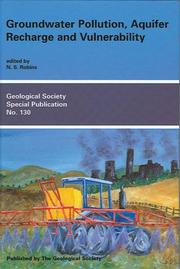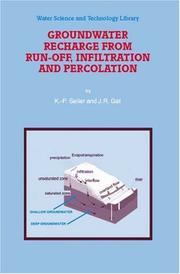| Listing 1 - 7 of 7 |
Sort by
|
Book
ISBN: 9781411321656 Year: 2007 Publisher: Reston, Va. : U.S. Geological Survey,
Abstract | Keywords | Export | Availability | Bookmark
 Loading...
Loading...Choose an application
- Reference Manager
- EndNote
- RefWorks (Direct export to RefWorks)
Geology --- Groundwater recharge --- Southwest, New --- Climate. --- Aquifer recharge --- Groundwater --- Groundwater increment --- Groundwater replenishment --- Increment (Groundwater recharge) --- Intake (Groundwater recharge) --- Natural groundwater recharge --- Natural recharge of groundwater --- Recharge of groundwater --- Replenishment of groundwater --- Water-supply --- Natural recharge --- Recharge --- Sunbelt States
Book
ISBN: 9780521863964 0521863961 9780511780745 9780511902239 0511902239 9780511799082 051179908X 0511780745 9781108446945 1108446949 0511850638 110721016X 1282771507 9786612771507 0511901445 0511797680 0511900651 9780511850639 9781282771505 661277150X 9780511901447 9780511797682 9780511900655 Year: 2010 Publisher: Cambridge New York Cambridge University Press
Abstract | Keywords | Export | Availability | Bookmark
 Loading...
Loading...Choose an application
- Reference Manager
- EndNote
- RefWorks (Direct export to RefWorks)
"Understanding groundwater recharge is essential for successful management of water resources and modeling fluid and contaminant transport within the subsurface. This book provides a critical evaluation of the theory and assumptions that underlie methods for estimating rates of groundwater recharge. Detailed explanations of the methods are provided - allowing readers to apply many of the techniques themselves without needing to consult additional references. Numerous practical examples highlight benefits and limitations of each method. Approximately 900 references allow advanced practitioners to pursue additional information on any method. For the first time, theoretical and practical considerations for selecting and applying methods for estimating groundwater recharge are covered in a single volume with uniform presentation. Hydrogeologists, water-resource specialists, civil and agricultural engineers, earth and environmental scientists and agronomists will benefit from this informative and practical book, which is also a useful adjunct text for advanced courses in groundwater or hydrogeology"--Provided by publisher.
Groundwater recharge --- Mathematical models. --- Hydrogeology. --- Geohydrology --- Geology --- Hydrology --- Groundwater --- Aquifer recharge --- Groundwater increment --- Groundwater replenishment --- Increment (Groundwater recharge) --- Intake (Groundwater recharge) --- Natural groundwater recharge --- Natural recharge of groundwater --- Recharge of groundwater --- Replenishment of groundwater --- Water-supply --- Natural recharge --- Recharge --- Mathematical models
Book
ISBN: 9264238700 9264238697 Year: 2015 Publisher: Paris, France : Organisation for Economic Co-operation and Development,
Abstract | Keywords | Export | Availability | Bookmark
 Loading...
Loading...Choose an application
- Reference Manager
- EndNote
- RefWorks (Direct export to RefWorks)
Groundwater has provided great benefits to agriculture irrigation in semi-arid OECD countries, but its intensive use beyond recharge in certain regions has depleted resources and generated significant negative environmental externalities. The report provides a characterisation of the diversity of groundwater systems, reviews policies in OECD countries, and proposes a package of recommendations to ensure that groundwater can sustain its services to agriculture and contribute to climate change adaptation.
Agriculture and Food --- Groundwater --- Groundwater recharge --- Environmental aspects --- Aquifer recharge --- Groundwater increment --- Groundwater replenishment --- Increment (Groundwater recharge) --- Intake (Groundwater recharge) --- Natural groundwater recharge --- Natural recharge of groundwater --- Recharge of groundwater --- Replenishment of groundwater --- Water-supply --- Ground water --- Subterranean water --- Underground water --- Water, Underground --- Water --- Hydrogeology --- Natural recharge --- Recharge
Book
ISBN: 392270591X Year: 1990 Publisher: Hannover ; Leipzig : Heinz Heise,
Abstract | Keywords | Export | Availability | Bookmark
 Loading...
Loading...Choose an application
- Reference Manager
- EndNote
- RefWorks (Direct export to RefWorks)
556.38 --- Groundwater flow --- #Hist.Geol. --- Flow, Groundwater --- Hydraulics --- Fluids --- Subsurface drainage --- Groundwater basins. Groundwater management --- Migration --- 556.38 Groundwater basins. Groundwater management --- Groundwater recharge --- #Hist.Geol --- Aquifer recharge --- Groundwater --- Groundwater increment --- Groundwater replenishment --- Increment (Groundwater recharge) --- Intake (Groundwater recharge) --- Natural groundwater recharge --- Natural recharge of groundwater --- Recharge of groundwater --- Replenishment of groundwater --- Water-supply --- Natural recharge --- Recharge

ISBN: 1897799985 Year: 1998 Publisher: London : Geological Society of London,
Abstract | Keywords | Export | Availability | Bookmark
 Loading...
Loading...Choose an application
- Reference Manager
- EndNote
- RefWorks (Direct export to RefWorks)
Groundwater recharge --- Groundwater --- Water --- Wellhead protection --- Vulnerability of water to pollutants --- Vulnerability of water to pollution --- Water pollution potential --- Pollution --- Contamination of groundwater --- Groundwater contamination --- Groundwater pollution --- Aquifer recharge --- Groundwater increment --- Groundwater replenishment --- Increment (Groundwater recharge) --- Intake (Groundwater recharge) --- Natural groundwater recharge --- Natural recharge of groundwater --- Recharge of groundwater --- Replenishment of groundwater --- Water-supply --- Aquifer protection --- Drinking water protection --- Groundwater protection --- Source water protection --- Wellfield protection --- Water quality management --- Pollution potential --- Natural recharge --- Recharge
Book
ISBN: 1634858549 9781634858540 9781634858267 Year: 2017 Publisher: New York
Abstract | Keywords | Export | Availability | Bookmark
 Loading...
Loading...Choose an application
- Reference Manager
- EndNote
- RefWorks (Direct export to RefWorks)
Water-supply --- Water harvesting --- Groundwater recharge --- Water quality --- Freshwater --- Freshwater quality --- Marine water quality --- Quality of water --- Seawater --- Seawater quality --- Water --- Environmental quality --- Aquifer recharge --- Groundwater --- Groundwater increment --- Groundwater replenishment --- Increment (Groundwater recharge) --- Intake (Groundwater recharge) --- Natural groundwater recharge --- Natural recharge of groundwater --- Recharge of groundwater --- Replenishment of groundwater --- Harvesting, Water --- Precipitation trapping --- Rainwater catchment --- Rainwater harvesting --- Runoff collection --- Water conservation --- Rainwater --- Runoff irrigation --- Quality --- Composition --- Natural recharge --- Recharge

ISBN: 1281338877 9786611338879 1402053061 1402053053 9048173337 Year: 2007 Volume: 55 Publisher: Dordrecht, The Netherlands : Springer,
Abstract | Keywords | Export | Availability | Bookmark
 Loading...
Loading...Choose an application
- Reference Manager
- EndNote
- RefWorks (Direct export to RefWorks)
Groundwater constitute the most important reservoir of available clean water. Due to its overexploitation, some anthropogenic mismanagement on the surface and the overloading of the cleanup potential of subsurface, many of the groundwater systems used for water supply are in jeopardy. The problem is very severe in dry-lands, but also in urban, industrial, agricultural and traffic areas. This book first discusses the recharge fluxes relating both to the quantity and quality of groundwater. In order to face the threats to the water supply and to be able to maintain a sustainable water management policy, detailed knowledge is needed in between others on the surface to subsurface transformation link in the water cycle. Secondly, the presentation and comparison of both the traditional and modern approach to determine groundwater recharge is discussed. The traditional approach to determine groundwater recharge, is based on water balance estimates and hydraulic considerations, which yield instantaneous values at best but do not integrate the totality of recharge pathways in time and space. In contrast, environmental tracers do integrate these factors. Finally, the fate of groundwater recharge in the subsurface by hydraulic and geologic means is discussed in detail, in order to stimulate adapted groundwater management strategies and to better assess consequences of climate changes on groundwater resources as a whole. Audience This book will be of interest to hydrologists, hydro-geologists, engineers, geographers, agronomists, soil scientists, groundwater modellers, environmental physicists, limnologists.
Groundwater recharge. --- Hydrogeology. --- Geohydrology --- Geology --- Hydrology --- Groundwater --- Aquifer recharge --- Groundwater increment --- Groundwater replenishment --- Increment (Groundwater recharge) --- Intake (Groundwater recharge) --- Natural groundwater recharge --- Natural recharge of groundwater --- Recharge of groundwater --- Replenishment of groundwater --- Water-supply --- Natural recharge --- Recharge --- Hydraulic engineering. --- Environmental management. --- Environmental pollution. --- Environmental Management. --- Hydrology/Water Resources. --- Fluid- and Aerodynamics. --- Monitoring/Environmental Analysis. --- Waste Water Technology / Water Pollution Control / Water Management / Aquatic Pollution. --- Chemical pollution --- Chemicals --- Contamination of environment --- Environmental pollution --- Pollution --- Contamination (Technology) --- Asbestos abatement --- Bioremediation --- Environmental engineering --- Environmental quality --- Factory and trade waste --- Hazardous waste site remediation --- Hazardous wastes --- In situ remediation --- Lead abatement --- Pollutants --- Refuse and refuse disposal --- Environmental stewardship --- Stewardship, Environmental --- Environmental sciences --- Management --- Engineering, Hydraulic --- Engineering --- Fluid mechanics --- Hydraulics --- Shore protection --- Environmental aspects --- Hydrology. --- Fluids. --- Environmental monitoring. --- Water pollution. --- Biomonitoring (Ecology) --- Ecological monitoring --- Monitoring, Environmental --- Applied ecology --- Mechanics --- Physics --- Hydrostatics --- Permeability --- Aquatic sciences --- Earth sciences --- Hydrography --- Water --- Aquatic pollution --- Fresh water --- Fresh water pollution --- Freshwater pollution --- Inland water pollution --- Lake pollution --- Lakes --- Reservoirs --- River pollution --- Rivers --- Stream pollution --- Water contamination --- Water pollutants --- Water pollution --- Waste disposal in rivers, lakes, etc. --- Measurement --- Monitoring
| Listing 1 - 7 of 7 |
Sort by
|

 Search
Search Feedback
Feedback About UniCat
About UniCat  Help
Help News
News